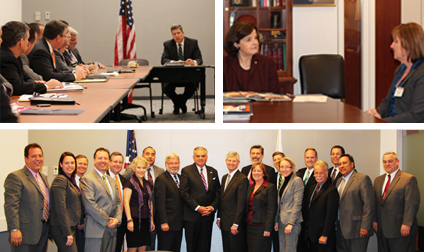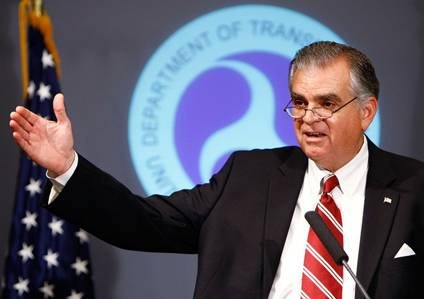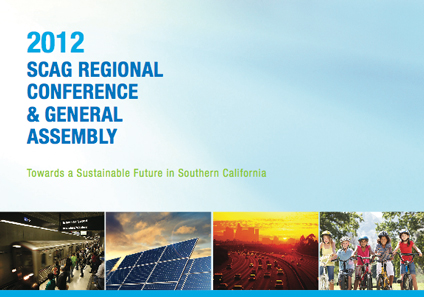Mobility 21 Fights for Transportation, Jobs
in Washington, D.C.
Members of Mobility 21, Southern California’s transportation advocacy coalition, met with key legislators and policy makers this week amidst intense federal transportation bill negotiations during an advocacy trip to Washington, D.C.
Transportation executives and business leaders called on members of Congress to pass the urgently-needed transportation bill and stay focused on what matters — job creation for millions of American workers.
“There’s no question that we need a robust federal transportation bill,” said Gary Toebben, Los Angeles Area Chamber of Commerce President & CEO and Mobility 21 Chairman. “What we’re asking for is a multi-year bill to give transportation planners more certainty in funding future transportation projects, and that means job creation here at home. With the extension of the current bill expiring on March 31st, we can’t afford to put this off any longer.”
Trip participants were armed with suggestions to stretch tax dollars further, cut red tape that holds up job-creating projects and maintain global competitiveness through investment in freight movement infrastructure.
“We’re not looking for a handout from the federal government. But we do need more flexibility to better use the money we raise locally through sales tax measures,” said Art Leahy, Los Angeles County Metropolitan Transportation Authority CEO and Mobility 21 Board Member. “With financing tools in America Fast Forward that make it easier to borrow money coupled with faster regulatory processes, we can deliver transportation projects years ahead of schedule and create jobs much sooner.”
Mobility 21 members met with Sen. Dianne Feinstein (D-Calif.), Reps. Xavier Becerra (D-Calif.), Ken Calvert (R-Calif.), Bob Filner (D-Calif.) and Linda Sánchez (D-Calif.), Secretary of Transportation Ray LaHood and other members of Congress integral in the passage of the transportation legislation.
“Nearly 40 percent of the nation’s goods enter the Ports of Long Beach and Los Angeles. These goods travel on freeways and railroads through the Inland Empire and out to the rest of the nation, creating 3.4 million jobs nationally and $29.9 billion in tax revenue,” said Anne Mayer, Riverside County Transportation Commission Executive Director and Mobility 21 Vice Chair. “We’re looking to Congress to invest in the national freight infrastructure assets here in Southern California.”
View Mobility 21’s legislative visit meeting materials on top priorities for 2012, transportation bill recommendations, innovative federal financing tools, the need to protect funding for transportation, recommendations toimprove federal processes that delay transportation projects and the importance of goods movement.
Department of Transportation Secretary Ray LaHood is responsible for implementing the Administration’s priorities for transportation, including safety, creating jobs and sustainability. Photo Credit: Getty Images
Feature Interview:
Secretary Ray LaHood Tackles Funding Issues,
Alternative Technologies and High-Speed Rail
M21: With the stimulus program winding down and nothing in sight in terms of a gas tax increase or other alternative revenue sources for transportation, how are we going to avoid draining the Highway Trust Fund and bringing the federal transportation program to a halt?
RL: At this make-or-break moment for the middle class, the President has proposed a six-year transportation jobs plan that puts people back to the much-needed work of rebuilding our infrastructure. He has boldly proposed that we take the money that we’re saving from winding down wars in Iraq and Afghanistan, use half of it to pay down our debt, and use the other half on a six-year transportation plan that lets American workers do some nation-building right here at home.
M21: Study after study has documented the need for a greater investment in transportation infrastructure. Why can’t the President and Congress make any progress on addressing the issue so that we can adequately maintain and improve the country’s transportation system?
RL: The good news is that transportation has been in the news a lot lately and both the House and Senate are debating long-stalled legislation. President Obama and I are supporters of the Senate’s bipartisan approach, and we’re pleased with the progress in the Senate. Also, the President has proposed a six-year transportation jobs plan, part of his blueprint for an America Built to Last, that would create jobs investing in our infrastructure, spur innovation across our transportation systems and maintain our laser-focus on safety, our number one priority. The President’s plan would be paid for by winding down our wars in Iraq and Afghanistan. President Obama is doing all he can to get transportation projects moving, including calling on agencies to slash red tape to speed the delivery to save money and get workers on job sites more quickly.
I am hopeful that as more and more Americans become aware of what is at stake we will start seeing progress on this front.
M21: Do you think that a VMT tax will eventually replace the traditional gas tax?
RL: As the President has noted, too many families today find themselves taking on more and more debt just to keep up. For this reason, the President has made it clear that he does not support increases to the gas tax or a VMT tax. President Obama has proposed a better way to pay for needed increases in transportation funding, especially as the economy recovers, by using the money we are saving by winding down the wars in Iraq and Afghanistan.
M21: What role do you think electric vehicles and other alternative fuel vehicles will play in increasing overall auto fuel efficiency and reducing greenhouse gas emissions?
RL: The Department of Transportation believes that electric vehicles show great promise as a safe, fuel-efficient and energy-independent option for American drivers. As manufacturers continue to develop and improve the technology in this area, we expect increasingly efficient vehicles that not only save consumers money at the pump, but also help protect the air we breathe and reduce greenhouse gas emissions. The promise of this technology is one reason USDOT and the Environmental Protection Agency included incentives for developing these vehicles as part of the latest proposed fuel economy and greenhouse gas reduction program for MY2017-2025.
M21: California’s high-speed rail project is mired in controversy – in part because it is dependent on federal funds for a portion of its overall funding and the required long-term commitment of federal funds is not in place. How can a major project like this proceed without its funding sources being on a firmer foundation?
RL: High-speed rail is absolutely essential to California’s economic future. Earlier this month, I traveled to Fresno, Sacramento and Los Angeles where I met with elected officials and manufacturers who were excited about the potential for high-speed rail. They were exited not only because high-speed rail is a game changer for U.S. transportation, but because of the great things it means for American jobs and American manufacturing.
The President’s budget request provides $2.5 billion for the first year of a six-year, $47 billion rail investment plan. This will help the Federal Railroad Administration continue to work with states as they plan and develop high-speed and intercity passenger rail corridors across the country. It will also place high-speed rail on equal footing with other transportation programs, revitalize domestic rail manufacturing, and ensure that the nation can reach President Obama’s goal of providing 80 percent of Americans access to high-speed rail within 25 years.
California’s highways are among the most congested in the nation, costing residents and businesses in Los Angeles and San Francisco alone nearly $13.5 billion a year. Delayed flights at six of California’s major airports have an economic cost of more than $1 billion a year. With the state’s population set to grow another 60 percent by 2050, we simply can’t build enough freeways and runways to accommodate all of those new commuters and travelers. Even if there was enough space to add sufficient additional lanes to highways and runways, the estimated costs for that approach run more than $170 billion, almost double the highest estimates for high-speed rail.
We can’t afford not to invest in California high-speed rail.
Move LA Hosts Transit Conversation
Move LA, a coalition dedicated to the advancement of public transportation in Los Angeles County and championing strategies to accelerate its implementation, hosted its 4th Annual Transportation Conference. Nearly 300 transportation professionals convened at the old ticket room at LA Union Station to hear an update on Los Angeles’ 30-10 Plan, potential funding sources and transit-oriented developments.
Art Leahy, Los Angeles County Metropolitan Transportation Authority CEO and Mobility 21 Board Member, addressed why the 30-10 Plan, now known nationally as America Fast Forward, must be accomplished. “This is essential — this is indeed a bold endeavor of great importance,” said Leahy during his presentation. “Our goal is create a quarter of a million jobs sooner, not over a 30-year period, but in a ten-year period.”
Move LA created the coalition which led to the formulation and passage of Measure R on the November 2008 ballot. The result: voter approval for a half-cent sales tax increase that will provide an estimated $40 billion in funding for transportation projects in Los Angeles County over the next 30 years. Approximately 70 percent of these funds will be used for clean public transit projects and programs.
Sen. Feinstein Reaffirms Commitment to
Goods Movement in Riverside County
Senator Dianne Feinstein (D-CA) joined members of the Greater Riverside Chambers of Commerce this month to provide an update on federal issues impacting Southern California. Feinstein focused much of her discussion on ways she and other members of Congress are providing assistance to homeowners struggling to pay their mortgage, as well as her work as Chair for the Senate Committee on Intelligence.
But when asked if she supports funding for goods movement and national corridors of significance, especially in the upcoming transportation bill, Feinstein emphatically answered, “yes.”
“I have supported goods movement and I’ve used this county, and particularly this city, as an example. We have these trains going out of Long Beach and Los Angeles harbor, coming into the heartland of America. The trains are going through Riverside with no separate rail, having to stop and creating all kinds of problems. This is a particularly vexing issue, because it’s long-term and it’s going to need some below-grade movement. It’s going to need a great deal of effort to get this job done and substantial funds. I have been a supporter from the beginning and I intend to continue that support.”
Mobility 21 applauds Feinstein’s commitment to goods movement investment.
 IE511 App Offers
IE511 App Offers
Commuter Breakthrough
Every day, Southern Californians waste 1.8 million vehicle hours stuck in traffic. If you ask most people about their commute, it’s the worst part of their day.
Now a new free app for IE511, the online traffic service for Inland Empire commuters, delivers a quality on-the-go solution for re-routing their commutes around congestion. The app is available in both the iTunes Store and Android Market.
“We see this as an excellent return on taxpayer investment,” commented Riverside County Transportation Commission Chairman John J. Benoit, a Riverside County Supervisor and former CHP Commander. “This new free app is not only a great service, it helps the people we serve save time and money. They can get to work on time, get home sooner and save money on gas.”
The app features real-time traffic information, incident and sig alert information, cameras and advisories posted on changeable message signs.
Mayor Villaraigosa Urges Congress
to Approve Funding in President’s Budget
Los Angeles Mayor and Metro Board Chair Antonio Villaraigosa welcomed the inclusion of $50 million in President Obama’s proposed FY13 Budget for the Westside Subway Extension and $31 million for the Regional Connector Project, calling the actions a vote of confidence for two priority, regionally significant transit projects that will bring improved mobility, jobs and economic development to the Los Angeles region.
The proposed funding within the President’s Fiscal Year 2013 budget — if approved by Congress later this year — can be combined with L.A. County’s voter-approved Measure R sales tax revenue and could jumpstart construction of both projects in 2013. Funding for the subway would go toward extending the Metro Purple Line to Westwood, and the Regional Connector would link several rail lines together in Downtown L.A.
“President Obama’s proposed budget makes it more likely than ever that shovels could soon break ground on these transit improvements that will greatly expand connectivity throughout the L.A. region,” said Villaraigosa. “The President has come through for Los Angeles County. Now it’s Congress’ turn: the House and Senate should pass the New Starts transit funding in the President’s budget so we can put people back to work.”
SCAG General Assembly
to Focus on Sustainability
Be sure to attend the 2012 Southern California Association of Governments (SCAG) Regional Conference and General Assembly, April 4–5, at the Westin Bonaventure Hotel in downtown Los Angeles. This year’s theme, “Towards a Sustainable Future in Southern California,” promises to be as exciting and interesting as ever. Join elected officials and transportation, environmental, economic, business and community leaders from throughout the region as they address issues vital to Southern California’s future. Visit SCAG’s website for registration, sponsorship and other information.
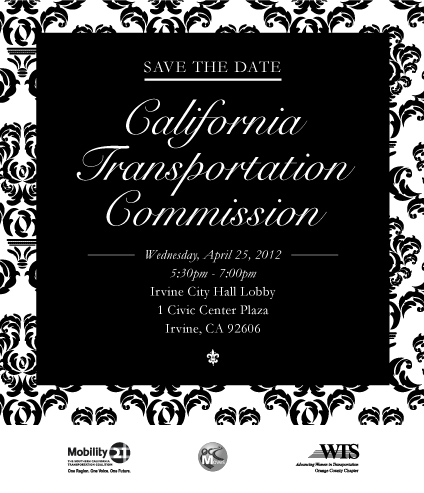
Mobility 21 to Co-Host
CTC Orange County Reception
Don’t miss your next opportunity to mix and mingle with members of the California Transportation Commission and top transportation executives at the reception co-hosted by Mobility 21, the Orange County Transportation Authority, OC Moves, and WTS Orange County.
5:30 – 7 p.m. Wednesday, April 25
Irvine City Hall Lobby
Sponsor | Event Flyer
$500 sponsorship includes:
Logo on all pre-event marketing materials
Logo on event signage
Company name recognition during the event
California Maritime Leadership Symposium
Draws Port Professionals to Annual Conference
Over the past 12 years, the California Maritime Leadership Symposium (CMLS) has become one of the premier events focused on briefing Sacramento’s policymakers on key matters related to the entire maritime transportation system. It is the only comprehensive forum for port executives, commissioners and other stakeholders across the state to seek resolution to the growing challenges the maritime transportation system faces.
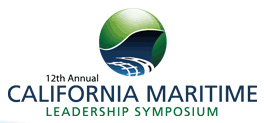 The CMLS is hosted by a broad-based coalition of the maritime industry. Each year, the coalition develops an exciting agenda and roster of high-profile speakers to address the most challenging and rewarding aspects of the maritime transportation system in California. Speakers include elected officials, California agency heads, port executives, industry executives, union leaders, leading economists and innovative technology developers. As a result of a strong agenda, the CMLS has been able to garner the attendance of a “who’s who” of the maritime transportation system in California and the nation.
The CMLS is hosted by a broad-based coalition of the maritime industry. Each year, the coalition develops an exciting agenda and roster of high-profile speakers to address the most challenging and rewarding aspects of the maritime transportation system in California. Speakers include elected officials, California agency heads, port executives, industry executives, union leaders, leading economists and innovative technology developers. As a result of a strong agenda, the CMLS has been able to garner the attendance of a “who’s who” of the maritime transportation system in California and the nation.
This year’s 12th Annual symposium highlighted the extraordinary maritime service of by California State Senator Alan Lowenthal and Richard D. Steinke, Executive Director of the Port of Long Beach. Lowenthal was honored as the 2012 Symposium Honoree of Merit and Steinke was selected to receive the 2nd Annual Gary L. Gregory Lifetime Achievement Award.
TRANSPORTATION EVENTS IN THE COMMUNITY
Friday, March 2
UCLA Luskin School of Public Affairs Complete Streets Initiative: Complete Streets for California 2012
more info
March 5-7
Los Angeles Area Chamber of Commerce:
Access Washington, D.C. Advocacy Trip
more info | register
Friday, March 9
Southern California Transportation & Logistics Summit
more info | register
Tuesday, March 13
Washington, D.C. California Transportation Reception
register
Wednesday, March 21
WTS-OC: Monthly Luncheon Featuring Metro and Caltrans Update
more info | register
Wednesday, March 21
ACEC: Public-Private Partnerships Luncheon
more info | register
Wednesday, March 28
WTS-IE: SR-91 Corridor Improvement Project Update
more info | register
Thursday, March 29
CMAA: LACMTA Regional Connector Transit Connector
more info | register
April 4-5
SCAG: General Assembly
more info | register
Thursday, April 19
CMAA: Los Angeles World Airports
more info | register
Wednesday, April 25
OCTA, Mobility 21, OC Moves, WTS-OC: Orange County CTC Reception
***corrected date***
more info | sponsor
Friday, May 4
CMAA: Breakfast with Michael Blomquist and Mitch Alderman
more info | register
May 14-17
ACEC: 2012 California Annual Conference, The Sheraton Maui Resort & Spa
May 22-23
California Transit Association: 46th Annual Spring Legislative Conference
more info | register
Friday, Sept. 28
Mobility 21 Annual Southern California Transportation Summit
Nov. 11-13
Self-Help Counties Coalition: Focus on the Future Conference
more info

